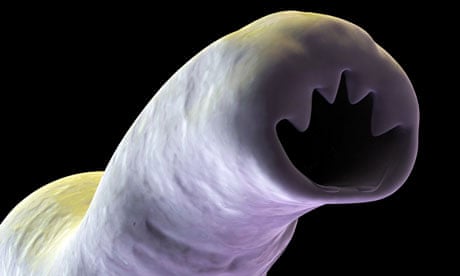Suppose I told you that your child had a one in four chance of being affected by a disease that causes lethargy, lack of motivation and impaired attention. You'd probably respond, "Is there a treatment?"
I've got good news: there are cheap and highly effective drugs to treat your child. Furthermore, if we implement an educational programme to change people's behaviour and make some simple modifications to the environment, there is every chance of eradicating the disease altogether.
"Let's do it!" you would probably reply.
The scenario is a true one, except for two details. The affected children are not in the UK, but in tropical countries with high levels of poverty. And there is not just one disease that fits this picture, but several.
In 2007, the World Health Organization published a global plan to combat a group of conditions known as neglected tropical diseases (NTDs). The commonest are parasitic infections, such as intestinal hookworm or schistosomiasis (bilharzia), associated with poor sanitation and lack of clean water. Both enter the body through the skin. Hookworm infection is typically acquired by walking barefoot on ground contaminated with faecal matter, whereas schistosomiasis enters the skin via contaminated water. The parasites then migrate around the body, with hookworm establishing itself in the gut, and schistosomiasis in the bladder, small intestine or colon. The parasites can live in the body for several years, with new generations of eggs being excreted in faeces or urine.
Both cause the symptoms described above, in addition to their physical symptoms.
Diseases such as these have been neglected for several reasons. They cause chronic ill health but they are not major killers, and so receive less attention than HIV/Aids or tuberculosis. Furthermore, affected individuals are often impoverished and marginalised, and may hide their condition because these diseases are stigmatised. In addition, they pose no immediate threat to people in Western societies and so can be safely ignored.
The campaign to increase recognition of these diseases has had a decidedly beneficial effect. Recent years have seen a raft of initiatives: pharmaceutical companies have donated drugs, a peer-reviewed journal on NTDs has been established, and various governmental programmes have been implemented. A WHO report last year describes how preventive treatment for schistosomiasis has been given to more than a million children in Madagascar; a national school-based programme to treat intestinal worms has been established in Cambodia; and an advertising campaign to alter the social perception of leprosy launched in Sri Lanka. There is much more work to be done, but the neglect is being countered.
Studies on the neuropsychological impacts of NTDs are not easy to do. For a start, tests suitable for Western children may not translate readily to other cultures. Ideally, children's performance would be compared before and after treatment, but this creates ethical problems if it entails withholding a treatment that is known to be effective from some children. And treating individual children can lead to reduced levels of infection in others in the community, so a treated/untreated comparison may be misleading.
Perhaps unsurprisingly, results to date have been inconsistent, but studies suggest that children infected with parasitic worms are likely to have impaired short-term memory and speed of mental processing (eg a study by Jukes et al in 2002). A study by Grigorenko and colleagues indicates that the most sensitive tests for measuring the cognitive effects of parasitic worms might be dynamic assessments, where the focus is on seeing how much the child can benefit from training during a test session, rather than measuring previously acquired knowledge and skills.
We are still a long way from understanding the mechanisms by which a given disease may affect cognitive function. For instance, a parasitic worm infection may have its main effect on educational progress by causing diarrhoea and malaise, leading the child to miss school or to be listless and unmotivated in the classroom. But there may be more direct effects on brain development caused by malabsorption of nutrients or iron-deficiency anaemia. It has also been suggested that the toxins generated by some parasites may affect brain function.
Such effects may be temporary, the child catching up with his or her peers once the infection has been cured, or long-lasting, if brain development is disrupted during a critical phase. Research in this area is difficult, but is urgently needed if we are to develop effective preventive strategies.
These diseases have been largely eradicated in Western societies. By increasing awareness of the scale of the problem and the relative ease with which it can be tackled, we can make them history in societies affected by poverty and poor infrastructure. As Jeffrey D Sachs noted in 2007, the devastating illnesses of the global poor could be controlled worldwide for the equivalent of a few days' worth of military spending.
For more information about how you can help make a difference go to the website of the Global Network for Neglected Tropical Diseases.
Dorothy Bishop is a professor in developmental neuropsychology at the University of Oxford and blogs at BishopBlog
This article was amended on Friday 26 November 2010. The original stated that schistosomiasis parasites establish themselves in the liver. This has been corrected.

Comments (…)
Sign in or create your Guardian account to join the discussion